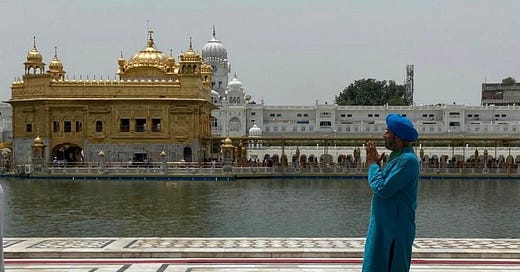If I Were Asked the Same Set of Questions Instead of Sri Sri Ravishankar ji....
What Would Have Been My Spontaneous Responses?”
"If I Were Asked Instead…" – Reflections of a Sikh Civil Servant
In one of the numerous WhatsApp groups of civil servants—serving and retired—that I am a part of, someone recently shared a rather insightful and thought-provoking interview with Sri Sri Ravi Shankar ji, conducted during a satsang on 10 April in Boone, North Carolina (USA). (follow link)
The conversation spanned a wide array of human experiences—from unanswered prayers and the burden of desires to working with difficult people and the purpose of life itself. It was couched in the spiritual idiom of the Art of Living, yet addressed dilemmas that are universal in nature.
As I read through the questions and answers, a thought crossed my mind: what if I were asked these very same questions? As a practising Sikh, a retired but ever-pragmatic civil servant, and someone deeply committed to secular values, how might I respond?
So I set myself that task. Here, then, is my take on those very questions, reframed through the lens of my personal journey and Sikh teachings.
Q: How do you keep faith in God even when your prayers go unanswered?
KBS: In Sikhi, faith in Waheguru is never based on whether one’s desires are fulfilled. Ardaas is an act of surrender, not a bargain. You place your longing at the feet of the Divine, and then accept the outcome with hukam—the understanding that there’s a larger script at work.
As Steve Jobs famously said, "You can’t connect the dots looking forward; you can only connect them looking backward." In my own life, the postings and promotions I missed often became the very turning points that redirected me toward deeper fulfilment. Sometimes, not getting what you want is the blessing.
A Guru, mentor, or guide can only illuminate the way. You have to walk the path yourself. No one—not even the Guru—can carry you on their shoulders.
Q: Is willpower part of the self or the intellect?
KBS: Willpower, in my view, is where intellect meets ego. It can serve you or sabotage you, depending on whether it is guided by humility and wisdom. In the Sikh tradition, Naam (the Divine Name) provides the inner strength to channel willpower towards righteous living.
Q: What’s your view on tarot card readers and psychics?
KBS: I approach such things with respectful scepticism. Sikhism discourages superstition and divination. Faith is not about peering into the future—it’s about living in charhdi kalaa (ever-rising spirits) while trusting in the now.
From a secular administrative standpoint too, decisions made from fear and uncertainty often lead to poor judgement. One must trust the unfolding of time, and remain grounded in reason and responsibility.
Q: Are silence and samadhi synonymous?
KBS: No, not entirely. Silence can be imposed; samadhi is attained. In Sikh terms, it's not merely about shutting out the world, but tuning in to the Divine resonance within. True silence is when the ego dissolves and Shabad alone remains.
Q: If someone lies to attend a spiritual event, does that go against moral principles?
KBS: Truth is a fundamental principle in Sikh thought and personal ethics. But context does matter. If, on rare occasions, a person bends the truth to attend a moment of spiritual importance—not for personal indulgence—one can understand the motivation. But it should never become a norm. Truth is too sacred to be treated casually.
Q: How do you handle frustration when things don’t go as planned?
KBS: I reflect on how much has gone my way, rather than what hasn’t. The human mind has a tendency to obsess over the 10% that remains incomplete, ignoring the 90% that has unfolded with grace.
Gurbani teaches that desires are endless. The key lies in cultivating santokh—contentment—and remembering that we were once thrilled by simple joys. Life isn’t about getting what you want, but about aligning with what you’re truly meant for.
Q: How do you overcome bad practices?
KBS: Through a combination of inner vigilance and external discipline. Sikhi doesn’t ask us to blindly reject everything, but to adopt what uplifts the soul. Whether as a vegetarian, a civil servant, or a family man, I have tried to make conscious choices guided by bibek buddhi—discriminating wisdom.
Q: How do you handle fear of public speaking or stage fright?
KBS: The fear often stems from self-consciousness. Once you shift your focus to the message rather than the messenger, it eases. Playfulness helps too. I often tell people to lose themselves in sewa and purpose—then fear dissolves.
Q: Do you think God created us to have fun?
KBS: I think life is more sacred than that. Joy is a part of it, yes—but not frivolous joy. The Sikh way is to see life as an opportunity to realise divinity within, to do sewa, and to live meaningfully. Fun, when detached from purpose, becomes distraction.
Also, we must shed the notion of God as a bearded figure sitting in the clouds. In Sikh philosophy, God is Ik Onkar—formless, timeless, the eternal truth that vibrates through all creation.
Q: How do you deal with difficult or toxic colleagues?
KBS: I remind myself: their behaviour reflects their own turmoil, not my worth. If someone is bitter or perpetually critical, they’re often carrying wounds of their own. One must preserve one’s own mental balance.
A well-placed compliment, or even humour, can diffuse tension. But above all, don’t surrender your peace to someone else’s dysfunction.
Q: How do you know if your partner truly loves you?
KBS: That question often reflects our own doubt. A better one might be: “Do I love them as much as they love me?” Love reveals itself not through interrogation, but through presence, care, and quiet consistency. Rather than asking “Do you love me?”, try saying “Why do you love me so much?”—with trust, not suspicion. Love is felt more in how we give than in how we seek reassurance.
Concluding Reflection
Faiths and beliefs are often intertwined, but at their core lies the pursuit of truth, justice, sewa, your unique ikigai and inner peace. In the Sikh tradition, as in other noble paths, it is not what you can extract from the planet—or even the universe—that matters. Rather, what you can contribute that resonates across time.
The true legacy of a life well-lived is not measured in monuments or memorials, but in the quiet yet enduring echoes of compassion, courage, and character that ripple through generations.






Very beautifully put. Great clarity of thought. May Gurbani and Sikh way of life keep enlightening our day to day lives. The essence of the treatise is to live in ‘now’ and submit to the Will of God yet doing one’s duty, remembering Him moment to moment and having kindness towards others, which your answers have brought out in simple comprehensible words. Keep it up bro.
🙏🏻🙏🏻🙏🏻🪯🪯🪯😇😇😇